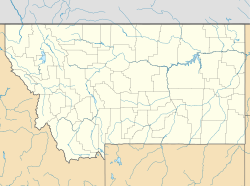| Fort Assinniboine | |
|---|---|
| Hill County, six miles southwest of Havre, Montana | |
 Company Officers' Quarters at Fort Assinniboine | |
| Site information | |
| Controlled by | United States |
| Site history | |
| Built | 1879 |
| In use | 1879–1911 |
| Battles/wars | Cree Campaign |
Fort Assinniboine | |
| Nearest city | Havre, Montana |
| Coordinates | 48°29′59″N 109°47′39″W / 48.49972°N 109.79417°W |
| Area | 160 acres (65 ha) |
| Built | 1879 |
| Architect | Lee, Col. J.G.C.; Devlin, L.K. |
| NRHP reference No. | 89000040
[3] (original) 100002250 (increase) |
| Significant dates | |
| Added to NRHP | May 31, 1989 |
| Boundary increase | April 2, 2018 |

Fort Assinniboine was a United States Army fort located in present-day north central Montana (historically within the military Department of Dakota). It was built in 1879 and operated by the Army through 1911. The 10th Cavalry Buffalo Soldiers, made up of African-American soldiers, were among the units making up the garrison at the fort. Determining that this fort was no longer needed after the end of the Indian Wars, the US Army closed and abandoned it.
In 1916 Congress authorized a reservation for the Rocky Boy's Band of Chippewa, who were landless. It became known as Rocky Boy's Indian Reservation, named after the chief who had sought the reservation. A portion of the fort was ceded in 1916 for use as a reservation; the land extended in both Hill and Chouteau counties. This was intended for landless Chippewa who had been pushed west out of their traditional territory. In the event, landless Cree and Metis, refugees from Canada, also settled at the reservation.
- ^ "National Register Information System". National Register of Historic Places. National Park Service. March 13, 2009.
- ^ Grit, Guts & Gusto: A History of Hill County, January 1, 1976, Hill County Bicentennial Committee (Author)
- ^ Montana State University Library, Collection 2457 - Fort Assinniboine Telegrams Received, 1881

